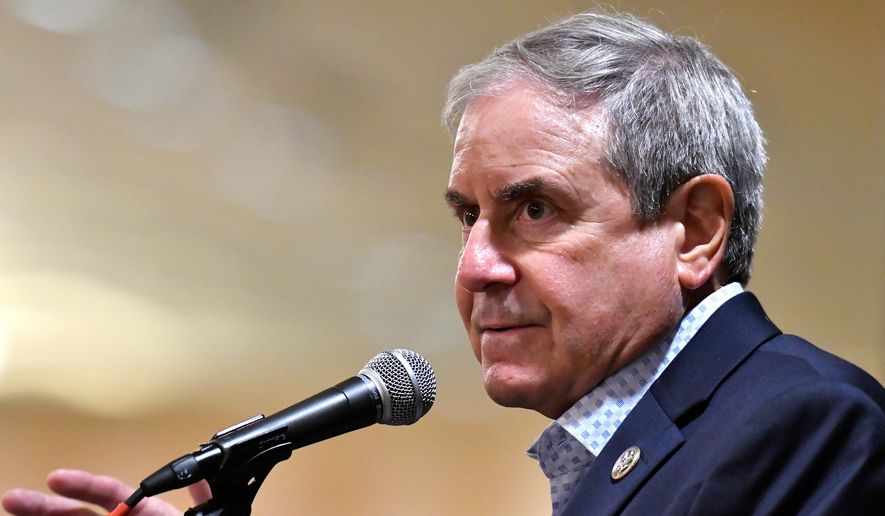Rep. John Yarmuth, the Kentucky Democrat who is in line to chair the House Budget Committee next year, said he hopes a panel that’s often seen as a small niche can play a bigger role in overseeing the Trump administration.
He said his goal isn’t to interfere with other committees, but said the budget is a big enough beast that it gives him a chance to look at immigration, climate change, artificial intelligence and tax policy, all of which can end up affecting the government’s bottom line.
“We don’t want to step on any other committee’s toes. But if we have an opportunity, we’ll find one,” Mr. Yarmuth said. “We will definitely pass a Democratic budget resolution, but we’re going to kind of reimagine the committee as the oversight committee on the budget for the taxpayers.”
Mr. Yarmuth is the ranking member on the committee now, putting him in the pole position to be chairman when Democrats officially claim control next year. The chairmanship will still have to be confirmed by fellow Democrats, but that could be a formality.
His biggest job will be to pass a budget blueprint through the House and then try to get the GOP-led Senate to strike a deal — something that’s only happened twice in the last eight years.
The House budget committee did belatedly pass a blueprint this year, but the full House didn’t take it up and senators opted against going through the politically difficult process in an election year.
Rep. Steve Womack, Arkansas Republican and the current chairman, has lamented a lack of interest this year in getting members more engaged in the process.
Mr. Yarmuth acknowledged those concerns, and pledged to meet with various caucuses — as he has done as the committee’s ranking member — to try to see where folks can find common ground.
“A lot of it is the frustration knowing that it was more of a rhetorical exercise and people treated it like that,” he said.
For example, he said the last few GOP-passed budgets included significant reductions in projected spending on entitlement programs like Medicare and Medicaid that neither side expected ever would become law.
Republicans did muscle through 2017 and 2018 budget plans, but GOP lawmakers openly acknowledged that their chief priority in those measures was to unlock a fast-track tool they used to try to repeal Obamacare and to pass new tax cuts.
Mr. Yarmuth said some members of the 36-member committee are active for only a few days each year — when they hold a hearing on the president’s annual submission, and then when the panel votes on whatever blueprint party leaders tell them to pass.
The congressman said he will try to give members more chances to be active — but he wouldn’t guarantee he’ll have more success than the GOP, which was unable to get its members in the full House on board.
Mr. Yarmuth said he, too, will have to try to find unity among a party comprised of new liberal firebrands and a coalition of moderates.
“We’ve got a much more diverse caucus now, and so that’s one area where I’m not sure — different philosophies might be an impediment,” he said. “Whether we can put together a resolution that is sufficiently disciplined to bring the new Dems and the Blue Dogs on board — we’re going to have to work hard at it.”
Add to that the difficulties in reducing a government debt nearing $22 trillion, and he’s got a high hill.
After the most recent series of shutdown showdowns and stopgap budgeting, lawmakers directed a bipartisan select committee to offer changes to the federal budget process by the end of the year as part of a two-year budget deal struck in February.
Despite ambitious talk about potentially abolishing the debt ceiling and forcing lawmakers to stay in Washington, D.C. until they pass all their budget and spending bills, the 16-member panel has instead coalesced around a modest package centered on switching from a one-year to a two-year budget time frame.
Mr. Yarmuth, one of eight Democrats on the evenly divided panel, said many lawmakers went into the process believing the recent dysfunction was less about process and structure and more about politics.
“As we talked through all these things, many of the ideas which didn’t get consensus I think kind of vindicated that position,” he said. “It looks like the things that we’re going to come out with will make some improvements to the system in the process, which I think is good [but] I never expected anything really radical. Ultimately, it’s us being responsible.”
• David Sherfinski can be reached at dsherfinski@washingtontimes.com.




Please read our comment policy before commenting.